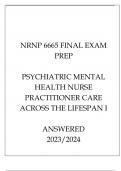NRNP 6665 FINAL EXAM
PREP
PSYCHIATRIC MENTAL
HEALTH NURSE
PRACTITIONER CARE
ACROSS THE LIFESPAN I
ANSWERED
2023/2024
,1. What are the three main components of a mental status examination (MSE)? How would
you conduct an MSE for a child, an adolescent, and an older adult?
- The three main components of a MSE are appearance and behavior, thought process and
content, and mood and affect. To conduct an MSE for a child, you would use age-
appropriate language and tools, such as drawings, puppets, or toys, to elicit information
and observe the child's interactions with the environment and caregivers. To conduct an
MSE for an adolescent, you would use open-ended questions and rapport-building
techniques, such as reflecting, summarizing, and validating, to explore the adolescent's
thoughts, feelings, and behaviors. You would also assess the adolescent's level of
development, peer relationships, and risk factors for substance use, violence, or suicide.
To conduct an MSE for an older adult, you would use respectful and empathic
communication, taking into account the older adult's sensory impairments, cognitive
status, and cultural background. You would also assess the older adult's functional
abilities, social support, and coping skills.
2. What are some common psychiatric disorders that affect children and adolescents? What
are the diagnostic criteria and treatment options for each disorder?
- Some common psychiatric disorders that affect children and adolescents are attention-
deficit/hyperactivity disorder (ADHD), autism spectrum disorder (ASD), oppositional
defiant disorder (ODD), conduct disorder (CD), anxiety disorders, depressive disorders,
bipolar disorder, and psychotic disorders. The diagnostic criteria for each disorder are
based on the Diagnostic and Statistical Manual of Mental Disorders (DSM-5), which
specifies the symptoms, duration, severity, and impairment required for a diagnosis. The
treatment options for each disorder may include psychotherapy, pharmacotherapy,
psychoeducation, family therapy, behavioral interventions, school-based interventions,
and referral to specialized services.
3. What are some common psychiatric disorders that affect older adults? What are the
diagnostic criteria and treatment options for each disorder?
- Some common psychiatric disorders that affect older adults are cognitive disorders, such as
Alzheimer's disease and vascular dementia; mood disorders, such as major depressive
disorder and bipolar disorder; anxiety disorders, such as generalized anxiety disorder and
panic disorder; psychotic disorders, such as schizophrenia and delusional disorder; and
substance use disorders. The diagnostic criteria for each disorder are based on the DSM-5,
which specifies the symptoms, duration, severity, and impairment required for a
diagnosis. The treatment options for each disorder may include psychotherapy,
pharmacotherapy, psychoeducation, family therapy, cognitive stimulation therapy,
, reminiscence therapy, reality orientation therapy, validation therapy, behavioral
interventions, environmental modifications, and referral to specialized services.
4. What are some of the ethical principles and legal issues that guide psychiatric mental
health nurse practitioner practice? How would you apply them in different scenarios
involving informed consent,
confidentiality,
duty to warn,
mandatory reporting,
and
substitute decision-making?
- Some of the ethical principles that guide psychiatric mental health nurse practitioner
practice are autonomy,
beneficence,
nonmaleficence,
justice,
and
fidelity.
Autonomy means respecting the patient's right to self-determination and informed consent.
Beneficence means acting in the best interest of the patient and promoting their well-
being. Nonmaleficence means avoiding harm or minimizing harm to the patient. Justice
means treating patients fairly and equitably. Fidelity means being faithful to the patient
and honoring the trust relationship. Some of the legal issues that guide psychiatric
mental health nurse practitioner practice are confidentiality,
duty to warn,
mandatory reporting,
and
substitute decision-making.
Confidentiality means protecting the patient's privacy and disclosing information only with
their consent or when required by law. Duty to warn means alerting potential victims or
authorities when a patient poses a serious threat of harm to self or others. Mandatory
reporting means notifying appropriate agencies when a patient is a victim or perpetrator
of abuse or neglect. Substitute decision-making means appointing a surrogate or guardian
to make decisions for a patient who lacks capacity or competence. To apply these ethical
principles and legal issues in different scenarios,
you would need to assess the patient's situation,
identify the relevant ethical and legal aspects,
, weigh the benefits and risks of different options,
consult with colleagues or experts if needed,
and document your rationale and actions.
5. What are some of the roles and responsibilities of a psychiatric mental health nurse
practitioner in different settings,
such as primary care,
acute care,
long-term care,
community care,
and
telehealth?
- Some of the roles and responsibilities of a psychiatric mental health nurse practitioner in
different settings are:
- Primary care: providing screening,
assessment,
diagnosis,
treatment,
and
follow-up
for patients with common or co-occurring psychiatric disorders;
collaborating with primary care providers and other
1. What are the four main components of a mental status examination (MSE)? How would you
conduct an MSE for a child, an adolescent, and an older adult?
- The four main components of an MSE are appearance, behavior, cognition, and
mood/affect. To conduct an MSE for a child, you would use age-appropriate language and
tools, such as drawings, games, or toys, to assess their cognitive and emotional
development, as well as their interaction with the environment. To conduct an MSE for
an adolescent, you would use open-ended questions and rapport-building techniques to
elicit their thoughts, feelings, and behaviors, as well as their coping skills, peer
relationships, and risk factors. To conduct an MSE for an older adult, you would use a
comprehensive geriatric assessment that includes cognitive screening, functional status,
social support, and medical history, as well as their mood, affect, and perception of




